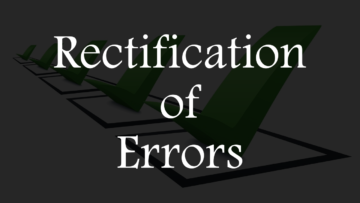In business, transactions are managed by the accounting process which involves many processes like identifying, measuring, recording, classifying, etc. transactions. Many types of errors can occur while using the accounting process, such as errors while recording the transactions in the respective books, not following the accounting rules properly, etc. All these errors create obstacles in the accounting process due to which accounting reports are not prepared correctly.
Trial balance is prepared to detect accounting errors occurring up to the classification stage in the accounting process. With its help, arithmetic errors, double-entry system errors, etc. can be detected. When the transactions are recorded and classified at the respective places, trial balance is prepared as it requires the balance of all the related accounts. When the trial balance is prepared the further process is started. Preparing trial balance is not mandatory as it is not a part of the accounting process.
Note: Due to increasing technology, manual work is decreasing.

Table of Contents
What is Trial Balance?
Meaning of Trial Balance
Trial balance is a list or summary of account balances as it shows only the names of the accounts and their balances. It is prepared to detect accounting errors such as arithmetic errors, errors in accounting rules, etc. It is prepared when the classification stage of the accounting process is finished. To prepare this, firstly all the related accounts are closed, then their balances are recorded in the format of trial balance.
There are two balance columns given in the trial balance format, one is the debit balance column, and the other is the credit balance column, all the debit balances are recorded in the debit balance column, and all the credit balances are recorded in the credit balance column. After recording all the details both columns are summed, if both sides match, then it is considered that there is no error in the accounting process, if both sides do not match then it is considered that there is an error in the accounting process. If both sides do not match, a suspense account can be used.
Definition of Trial Balance
According to J.R Batliboi – “A trial balance is a statement, prepared with the debit and credit balances of the ledger accounts to test the arithmetical accuracy of the books.”
According to R N Carter – “It is a schedule or list of those debit or credit balances which are extracted from various accounts in the ledger and balances of cash in hand, cash at bank as shown by cash book are also included in it.”
According to William Pickles – “The statement prepared with the help of ledger balances, at the end of the financial year (or at any other date) to find out whether the debit total agrees with the credit total is called trial balance.”
According to Rolland – “The final statement of joint and mixed balance is called trial balance.”
Features of Trial Balance
Following are the features of trial balance:
1. Statement:
Trial balance is a statement of the balance of accounts as it shows the balance of the respective accounts. It is similar to the balance sheet, but both have different purposes. All transactions are systematically recorded before calculating the account balance. Accounts whose balance is debit are recorded on the debit side and accounts whose balance is credit are recorded on the credit side. This also helps in understanding the account balance.
2. Not an Account:
Trial balance is not an account, because it is a statement or list of accounts. It is prepared after preparing a ledger account, cash book, etc. because only their balance is shown in it. In simple language, it is prepared when the classification stage of the accounting process is completed. It also has two amount columns which show the debit balance and credit balance of the accounts.
3. Checker:
Trial balance is performed as a checker as it helps in identifying arithmetic errors, double entry system errors, etc. If the balances on both sides of the trial balance match, then it can be assumed that there is no arithmetic error, similarly if both sides of the trial balance do not match then it can be assumed that there is an arithmetic error.
4. Before Final Account:
Many types of accounting errors can occur while identifying, measuring, recording, classifying, etc. transactions which can hinder the preparation of final accounts. Therefore, to detect these errors, trial balance is prepared before the final accounts. Once the correct trial balance has been prepared, the preparation of the final accounts can be started. Preparing trial balance is not mandatory, it completely depends on the business.
5. Periodically:
Trial balance is prepared periodically like weekly, monthly, quarterly, half-yearly, and at the end of the financial year, etc. Whether to prepare a trial balance or not depends entirely on the business. If a business wants to prepare a trial balance, it first has to complete the classification stage of the accounting process.
Read Also:
QNA/FAQ
Q1. What is trial balance?
Ans: Trial balance is a list or summary of account balances as it shows only the names of the accounts and their balances.
Q2. Does trial balance help in identifying arithmetic error?
Ans: Yes, trial balance helps in identifying the arithmetical error, but not completely.
Q3. Is a trial balance an account?
Ans: No, trial balance is not an account as it is a statement.
Q4. Is trial balance prepared before final accounts?
Ans: Yes, trial balance is prepared before final accounts.
Q5. Is trial balance a part of accounting process?
Ans: No, trial balance is not part of the accounting process.
Q6. Is it mandatory to prepare trial balance?
Ans: No, preparing trial balance is not mandatory.
Q7. Write the features of trial balance.
Ans: Following are the features of trial balance:
1. Trial balance is a statement.
2. Trial balance is not an account.
3. Trial balance helps to identify arithmetic error.
4. Trial balance is prepared before final accounts.
5. Trial balance is prepared from time to time.













